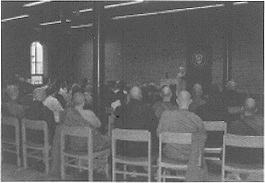|
自殺,在當今的時代是一個越來越嚴重的社會問題。社會學界和醫學界都越來越關切對自殺現象的研究,宗教界也不例外。不論是西方的天主教,還是東方的佛教,他們都主動或因應地對自殺現象進行解釋。他們的看法如何呢?帶著這樣的好奇,我參加了在明州聖約翰大學舉行的演講,恒實法師和詹姆士教父主講「生死和死後之生命」。
十月二十八日下午,天氣晴冷。中西部佛教協會一行七人,驅車一個多小時來到了富有盛名的聖約翰大學,聆聽了這場演講。首先由恆實法師開示。他引用了很多故事和經歷,娓娓地講述世間的人跟死亡的經歷。我清楚地記得恒實法師講述了一位老太太,她令一對在矽谷工作的年輕鄰居夫婦,因她的修行和往生而信佛的故事。恒實法師一邊敲木魚,一邊誦「阿彌陀佛」;一邊敲法器,一邊講故事,最後並演唱了他譜寫的勸人頌揚佛號的歌曲。恒實法師的演講深深地打動了我。
詹姆士教父在恒實法師之後也作了精彩的演講。他也引用了許多故事講述了無懼死亡和美好天堂的道理。從詹姆士教父和恒實法師的演講當中,我可以感受到天主教和佛教對於生死和死後世界理解相似的地方。天堂的美好,淨土的安詳,都是激勵著世人行善,走向光明大道。
演講結束了,自殺的問題並沒有被提及。這個炙熱的問題使我迫不及待的舉起了手,我成了第一個提問題的人。「請問,天主教和佛教是如何看待自殺問題?」說完之後,我發現在座的聽眾中,有不少的人微微的點頭。我暗暗的對自己說:「看!不僅僅是你自己有這樣的問題,許多在座的人也有同樣的疑問。」
教父和法師先後做了回答,從他們的回答中,我瞭解到不論是天主教還是佛教,都不認為自殺是一種可以被接受的行為。給我印象最深刻的是恒實法師的回答。他引用了這樣的一個比喻:一個人活在世界上,不僅僅是他/她自己的事。這一個人有父母,也許有兒女,有親戚、朋友、有同事和熟人。這所有的人生活在這個世界上,就好像是一塊經緯密織的布。如果這個人自殺了,就像這塊布中的一條經線或緯線被扯斷了。這不僅僅是一根線的問題,而是整塊布都會被波及,失去了完整。自殺是一種自私的行為,從佛教的角度來說,自殺也是犯了殺戒。
恒實法師分析了自殺的人可能會有的兩種動機:一,「我想結束一切」;二,「我想從頭來過」。從佛教的角度來看,有第一種動機的人相信一了百了,孰不知人有來生,肉體在塵世的死亡,並不等於你從此在宇宙中消失,你會隨業緣輪迴,投胎轉世。第二種動機的人相信有來生,他們結束痛苦的今生,寄望在來世從頭開始。他們會有幸福的來世嗎?未必。因為佛教講因果。你種什麼因,就會結什麼果。種好因,得好果;種壞因,得壞果。你殺了自己,也是犯了殺戒,是不好的因。世人不知道自己的前生,看不到自己的來世。那當我們面對困境,該怎麼辦?就在今生今世念佛、行善,是改變命運的辦法。
詹姆士教父說自殺的人有他人瞭解不到的苦衷。沒有苦,他就不會想到死。而且,那痛苦已經到了自己無法控制的地步,所以,他要自殺。他建議在自己控制不了的時候,不妨找外在的力量來幫助自己控制。有很多方法可以採用─心理咨詢,心理醫療,跟父母親戚保持交流,找朋友聊天,鍛練身體、去旅行,自己給自己減壓,告訴你的老闆或導師你的現實狀況,給自己的身心放個假。
依我的看法,你還可以念佛。因為佛無時不在,無處不在,他永遠不會放棄你的。說到念佛,我還想說,只有你自己是那個可以真正救你的人。一切的外力僅可幫助掌控你,而你自己才是那個從苦海中得度的關鍵。因為,心即是佛,佛即是心;一心念佛便得解脫。阿彌陀佛!
|
|
Suicide is becoming an increasingly serious social problem nowadays. Not only in sociology, but also in medicine, people are devoting more attention to researching the signs of suicide. Religions have been participating in this discussion. For example, both Catholics in the West and Buddhists in the East, actively or passively, find themselves addressing the phenomenon of suicide. What are their views then? With my curiosity piqued on this question, I attended a presentation entitled “Life, Death & Life Beyond Death,” in which DM Heng Sure portrayed the Buddhist perspective and Father James presented the Catholic perspective.
It was a cold but sunny afternoon on October 28, 2006, when seven people from the Midwest Buddhism Association drove for over an hour from Minneapolis to St. John’s University (in Minnesota) to attend the lecture. The talk started with DM Sure’s talk. He explained how human beings deal with death, sharing many stories and experiences. For example, he told us about a young couple working in silicon valley who were inspired to believe in Buddhism by an elderly lady after they observed her Buddhist practice and peaceful death. DM Sure recited Buddha’s name as he tapped the wooden fish, telling stories while showing us the Buddhist Dharma instrument. At the end, he sang a song he had composed, exhorting people to recite Buddha’s name. I derived great benefit from his talk.
Afterwards, Father James gave an amazing speech. He also told stories about peaceful deaths and the magnficence of heaven. From the two speakers, I understood that there were similarities in the way in which Catholics and Buddhists face life, death, and life beyond death. The bliss of heaven and the peaceful Pure Land encourage us human beings to do good deeds, be kind, and sincerely practice so that we walk towards brightness.
The speeches were over, but the issue of suicide had not been addressed. This burning question made me raise my hand. I was the first person to ask a question: “How did Catholics and Buddhists view suicidal behaviors?” I then realized that many people in the audience were nodding their heads and I told myself silently, “See, not only I, but many others have the same question!”

Father James and DM Sure answered the question respectively. In their answers, I learned that neither Catholics nor Buddhists think suicide is acceptable. What impressed me the most was the metaphor that DM Sure used: “You are not living all by yourself in a large sense. You have parents, you may have sons and daughters, you have relatives and friends, you have colleagues and acquaintances. All these people, together with you, become a tightly woven fabric. If you kill yourself, one thread in that fabric is gone. Now look at that piece of fabric again. It’s no longer a complete fabric. It’s torn apart! Remember, you are not living all alone! Suicide is a selfish behavior. In addition, from the Buddhist point of view, killing one’s self violates the precept against killing.”
DM Sure continued to analyze two motivations that the suicidal person might have: first, they want to put an end to everything; second, they want to start over. From the Buddhist point of view, people who hold the first motivation ignore the fact that there is life after death. Furthermore, one’s physical death does not mean that one is gone from the universe; one will be reborn according to his karma. People who hold the second motivation of wanting to start over, believe that there is life after death. They want to end the suffering now and start over afresh. Could they get a better life then? Not really, because the fundamentals in Buddhism are based on cause and effect. The effect you are going to have depends upon the causes you have planted in the past. Good cause leads to good effect. Bad cause result in bad effect. If one kills himself, one has violated the precept of not killing, which is not a good cause. However, human beings cannot see their past or future. What shall we do then? We should, in this life, recite Buddha’s name and do good deeds; these are the ways to change our fate.
Father James said people who kill themselves have bitterness that they cannot endure anymore. True. If they were not suffering, they would not want to die. The suffering is so huge that they lose control of their life. They feel that their only option is to commit suicide. Sad! We shouldn’t let this happen! If one cannot control himself, there are many forms of assistance available such as: psychological counseling, medical assistance, 24-hour suicide prevention hotlines, keeping in touch with family members, talking to friends, exercise, travel, decreasing pressure by letting your boss or supervisors know your situation, and allowing yourself a break.
In addition, I suggest you can recite Buddha’s names over and over again. Buddhas are everywhere. Although you cannot see them, they will never give up on you. I would also like to say, you are the only person who can save yourself from suffering. All external power can only help you control yourself, but you are the one who can liberate yourself from suffering since mind is the Buddha, Buddha is the mind. Single-mindedly reciting the Buddha’s name, one can eventually get liberated. Let’s recite Buddha’s name. Amitabha!
|